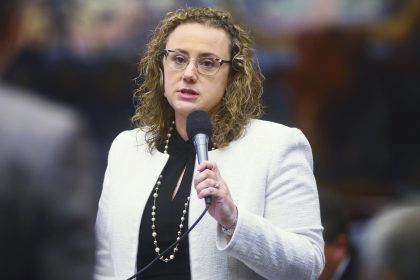‘Tremendous Degree of Variation’ Seen in Members Use of Social Media

WASHINGTON – Despite recent controversies around social media, members of Congress are using the platforms as much if not more than ever before to reach out to constituents — and no one approach applies to all, a Capitol Hill panel was told this week.
The ostensible reason for Thursday morning’s meeting of the Select Committee on Modernization of Congress was to discuss ways to improve the Franking process and bring it into the 21st Century.
Franking is the practice and privilege of making use of the U.S. mail to communicate with constituents to explain policy positions, discuss issues on the agenda in Congress, and notify citizens of upcoming town-hall meetings.
Early on, the nation’s franking statutes also allowed constituents to send mail to Congress, free of charge.
The rules governing franking have been revised many times over the past two-plus centuries, but as Rep. Rodney Davis, R-Ill., told the Modernization committee on Thursday, “there is much more to do in reforming the process.”
He should know. Since 2017, he and Rep. Susan Davis, D-Calif., who also addressed the panel, have been members of the bipartisan Commission on Congressional Mailing Standards, also known as the Franking Commission.
When it was established in 2017, the panel was charged with the task of relieving members’ frustrations with what many see as confusing and too-restrictive rules.
Both representatives agreed that Member-constituent communication is one of the basic building blocks of a representative democracy. But they also agreed keeping those lines of communication open hasn’t always been easy.
Each spoke in favor of greater transparency, a simpler set of rules, and the need to develop regulations that work for all the technological means members now have to communicate with their constituents.
With that, the Modernization Committee’s attention turned to Joshua Tucker, a professor of Politics, New York University and coauthor and editor of the non-partisan politics and policy blog The Monkey Cage at The Washington Post.
For the past seven years, Tucker has co-directed a research lab that studies politics through the prism of social media. For most of that time, he has also taught a course for New York University-Abu Dhabi for which his students’ final projects involve analyzing the social media usage of a member of Congress.
He noted that recent studies by the Pew Research Center have shown that as many as 70% of U.S. adults regularly use one social media platform or another, and that one reason is that it is an attractive alternative to direct mail.
“It is of course much less expensive, can be used much more frequently, has an interactive component to it that direct mail lacks, can reach much wider audiences than direct mail, and can be used to target citizens whose mailing address may change frequently,” Tucker said.
However, he noted, social media platforms themselves vary greatly.
YouTube, he said, is a platform for sharing videos. “Instagram and Snapchat are primarily for images … Twitter features short form text messages and is often used for sharing hyperlinks to other websites, especially news sites … WhatsApp is used for short messages … [and] Facebook and LinkedIn feature a format that can be used to share text, images, and videos.”
A May 2017 report from the LBJ School of Public Affairs at University of Texas Austin reported the average member of the 114th Congress had accounts on six different social media platforms.
“Thus it is likely the case that Members are experimenting with a variety of different versions of social media usage,” Tucker said.
“Yet, beyond the variation across platforms, there is a tremendous degree of variation in the ways in which individual Members of Congress use social media as part of their communications strategy,” he said.
Generally speaking, Tucker said, members of Congress recognize social media is an important part of their communication strategy, but there is no consensus on how to assess its effectiveness.
In addition, the organizational approach to managing social media production varies greatly across offices.
“Some offices have a very hierarchical structure with different people writing posts and then chains of command approving posts before they go online,” Tucker said. “Other offices simply delegate the job to a single person.
“In some offices, the Member of Congress will post directly; in other offices the Member never does so. This can also vary by platform,” the professor added.
Goals of Social Media Usage
Over the years Tucker and his students have found that Members’ goals in using social media vary widely.
Some simply want to explain policy positions, while others strive to illustrate what the “job” of being a member of Congress entails. Others recognize the need to document constituent service or to highlight their links to other members.
Of course most members engage in some kind of partisan activities via social media, and a large group simply strives to appear more human by posting about members of their families and the like.
However, Tucker and his students noted that while one of the great hallmarks of social media has been that it allows members to engage directly with their constituents and visa versa, a 2018 Congressional Research Service study found that “Members use the internet more for the dissemination of information than interactivity.”
“This accords well with interviews my students have done with congressional staff members who say that they avoid interaction on social media out of a variety of concerns,” Tucker said.
“These included both not wanting to alienate potential constituents with comments and also fear of alienating people to whom they did not respond,” he said.
As a result, he said, most members simply view social media as another means to disseminate information.
Despite the amount of time Members or their staff are devoting to social media, Tucker said he’s seen no evidence that there is an emerging consensus on what constitutes best practices.
Social Media Versus The U.S. Postal Service
Tucker said to the extent that the Modernization Committee is looking at social media as an alternative to traditional franked mailings, it’s important that they bear the differences between the two in mind as they formulate policy.
First, he said, the U.S. Post Service — contributions from the federal government notwithstanding — operates on a fee-for-service model. Social media platforms for the most part give away their services for free, but in return either package and sell users’ data and/or serve up ads to users.
“This has two important implications,” Tucker said. “Members of Congress can either use the “free” versions of social media platforms or can choose to purchase ads on social media platforms. Any policies surrounding social media usage by Members of Congress thus should carefully distinguish between these dual uses.”
In addition, he said, messages from Members of Congress that are viewed by the public may appear alongside ads over which the members have no control.
Although this situation varies by social media platform, Tucker advised the committee to consider this equivalent to a franking policy which allowed companies to insert advertisements into mail sent by Members of Congress
Social Media Is Not Geographically Constrained
Tucker noted that unlike traditional mail, which can be sent to a particular address, social media posts are delivered to a non-geographically constrained set of followers.
“While again this differs by platform, it is practically impossible to ensure that messages posted on social media platforms will only be seen by one’s constituents, which is basically a hallmark of traditional mail,” he said, adding this has two important implications.
The first is that Congressional communications will likely be written with two audiences in mind: one’s constituents and the mass public.
“It is worth considering whether this will contribute (or already is contributing) to the nationalization of politics,” Tucker said.
The other implication is that for all intents and purposes it is impossible to ensure “equality” in terms of exposure to messages when the medium is social media.
“Even if rules were established to, for example, equalize the number of videos a Member of Congress could post on their YouTube Channel or the number of Tweets they could post in a given day, it is always going to be the case that Members with larger number of followers will enjoy greater reach for their messages than those with fewer followers,” Tucker said.
Social Media Platforms Are For-Profit Companies
In contrast to the US Post Office, social media companies are large, multi-national, for-profit companies that are not controlled by the US government.
This, lawmakers should take seriously, Tucker said.
For one thing, no one outside of the company knows how companies determine what viewers will actually see.
“This is the elusive “algorithm” question: how does the platform serve up content?” Tucker said. “The fact that those outside the companies do not know how this algorithm works has huge implications for understanding the impact of social media on politics generally, but it also means Members of Congress will not know how their posts are prioritized relative to other content on the site; are unable control how – or even if – their content is seen; [and are] at the mercy of any changes the platforms decide to make in the future about how and when content is presented.”
And because the algorithms of social media platforms change constantly, “this is not even a problem that could be easily solved by regulation,” Tucker said.
“In general, any policy implemented vis a vis Members of Congress’ use of social media platform will be at the mercy of future changes made by large, for-profit companies,” he added.
























